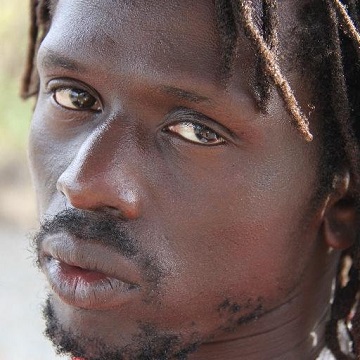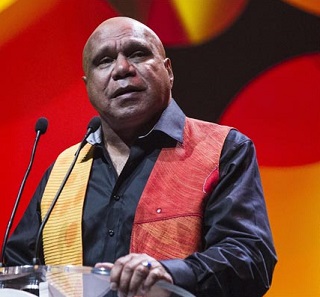
Emmanuel Jal survived several years as a child soldier in Sudan.
The Vancouver Folk Music Festival is celebrating its 40th anniversary this summer by bringing in a very strong line-up of musicians, including the likes of Billy Bragg, Joe Henry, Shawn Colvin and Jim Kweskin.
Some of our best local musicians will be at Jericho Beach Park July 13 – 16, as well. Roy Forbes, Jim Byrnes, The Sojourners and Bob Bossin have really stood the test of time, and I am particularly looking forward to seeing Ferron again.
Every year I try to keep an eye out for Christian musicians in the line-up. Last year was a real highlight, with Bruce Cockburn on hand. I wrote:
One of these days we’re going to sail away,
going to sail into eternity
some kind of ecstasy got a hold on me
All in all it was a magical experience. To top it off, the one new song Cockburn performed featured these words: “I’m on the Jesus train, headed for the city of God,” after saying “I didn’t think I’d ever be writing a song like this again.”
This year I am particularly looking forward to seeing two men – one from Sudan, the other from Australia – who survived childhood trauma and have lived to sing the tale.
Emmanuel Jal
Emmanuel Jal was born in Sudan, but now lives in Ontario. The Folk Fest bio says this about him:
Jal found an outlet and salvation for his turbulent life story in music, and emerged as a remarkable and inspiring recording artist. He achieved wide acclaim for his unique style of hip hop, with its message of peace, hope and reconciliation. He is also a passionate activist, fighting against poverty and child warfare, passionate about children’s rights issues and the plight of Africa.
For about five years Jal was a child soldier in Sudan, carrying an AK-47. Saved by a British aid worker, Emma McCune, he moved to Nairobi; tragically, she died a year later.
The Independent (based in London, UK) interviewed Jal in 2006 (Emmanuel Jal: Christian soldier):
“All that was a big culture shock,” Jal says. “I was disarmed and taken to a school in Kenya. I felt lost without my gun. It took time to learn to live with people without fighting them. I kept getting expelled for getting into fights. And I was haunted by terrible memories, like the time I had no food or water and was tempted to eat a human being.”
At 20, music entered his life. “When I went to church, I saw people dancing and singing. They were obviously happy. And I suddenly thought: if the God they were praying to in church was the same God who helped me when I was suffering so much, could I perhaps write for him some songs? So I did.
During a 2010 interview on Premier TV, Jal described, in part, how he was able to overcome his experiences as a child soldier:
One of the main things that actually pulled me even to believe more in God is, I was sleeping in a room, alone, and I was really terrified about how things were happening; nothing was clear in my life. I wanted to go to school, badly, and nothing was really happening.
One night I was sleeping in that room and a big light appeared. The light was so strong that when I closed my eyes, it was still strong. . . . Then all of a sudden, something happened with my mind; my mind was opened up and I was able to see people going to heaven, and I was able to see friends that I know are doing horrible stuff, and I was able to see how horrible I am even though I think I’m clean.
In the picture it became clear after a while . . . I saw a picture the way Jesus is, that kind with two angels behind him. Then I said, “Whatever I’ve done, forgive me.” When I just said that little word – “Whatever I’ve done, forgive me” – I was able to stand, I was able to walk in that light. Just that word gave me strength to stand in the light and talk.
During a TV interview on Context with Lorna Dueck last year, Jah said he retained the faith of his mother even while he was a child soldier. Asked if he questioned why God allowed him to go through that experience, he said:
At the time . . . the only question is, why are you allowing me to suffer? It wasn’t like, he cannot do it. I had faith that God would do a miracle. But the only thing that I was upset with God [about] was, why are you allowing me to suffer this way?
Does that question still linger?:
For any suffering that comes to me, I don’t question God, why are you allowing me to suffer, because I came to understand one thing – anything that has come your way, God has given you enough grace, if you only hold, because that problem has got an equivalent blessing behind it, once you come out of it. It’s no longer you, it’s not going to be about you any more; it’s going to be about the millions. . . .
If I’m bitter – there’s nothing I can do about my past, it’s history, it’s gone. But there’s something I can do about now.
And he has done a lot. He wrote War Child: A Child Soldier’s Story, he has produced five studio albums and he founded the charity Gua Africa, which provides education to refugees in South Sudan and Kenya.
I have no doubt that the Folk Fest audience will be very receptive to Jal’s music and his message, especially as that region is so much in the news again because of a new round of drought and starvation.
Archie Roach

Australian Aboriginal singer Archie Roach was part of the ‘stolen generation.’
The other performer I really want to see is Archie Roach. Like Jal, he had a tough childhood, but his relationship to the Christian faith seems more troubled. The Folk Fest bio suggests why:
One of the Stolen Generation of children taken from his family and placed in a non-Indigenous household, Archie survived a turbulent upbringing to develop into a powerful voice for Indigenous Australians. He’s a storyteller in the tradition of his ancestors, an advocate, mentor, role model and activist, as well as an internationally respected artist whose voice and message have resonated far beyond his homeland.
Though he will be playing at the Beyond (Christian) festival this fall, a 2013 ABC interview gives a sense of his spiritual journey – one which resonates all too well, no doubt, with many Indigenous Canadians:
Archie Roach: When [Australian] Prime Minister Kevin Rudd said sorry to the stolen generations it was like something shifted. There was weight that was lifted from my shoulders personally. And it was like I received, I accepted that apology. Not just on my behalf but on behalf of my mother and my father and my children. So for me it was a great thing.
A lot of people can say well Archie’s changed his tune, forgiving of people who have done this to him. I mean I won’t forget but I’m not going to let it burden me and weigh me down and make me sick any more. It’s time to get better and time to heal. . . .
Geraldine Doogue, narration: Archie’s life has turned full circle. . . . He lives in south-western Victoria again, near the Framlingham Aboriginal Reserve where he spent the first years of his life. And he visits from time to time.
AR: This was also where we finally came back to live. And this is where I was taken from as a little boy. My mother was born here on this old mission. And even though she’s not buried here, my mum’s family, my mum’s relatives, cousins, aunties and uncles are all buried here.
I suppose I don’t come back as often as I’d like to, to this place. But when I do come back it’s always, I think as you get older too there’s always a stronger feeling. This strong attraction that draws you to this place and you feel peaceful. Even though I haven’t spent much time here you still get that feeling of belonging to this place, to that spirit of place, “genius loci” as Manning Clark called it, spirit of place.
I started to believe that if you are close to the earth you are closer to God or the creator.
GD: Is it like a blend now for you of the idea of a God and this earth with a spirit life. Is it a blend or has one replaced the other?
AR: It’s probably a bit of a blend. In the foster homes I was brought up with Christian beliefs and then later on discovering my Aboriginal beliefs. I think summing it up. . .
Rather than Christian or religious I’m spiritual. I’m a spiritual man. And that’s what I call myself, that’s how I define myself today.
Roach is still sure that he likes gospel music:
AR: I’ve always loved gospel music ever since I first heard it and sung gospel music. It’s not necessarily the message or what it says or what it’s saying, it’s the feeling that you get from gospel music. You want to get up and clap your hands and stomp your feet and raise your hands and just like its joy, joy of life to be alive and joy being part of a community, bigger community and sharing that.
Sunday morning

Eilen Jewell will join the Sunday morning ‘gospel workshop.’
And that’s what the Folk Fest audience clearly feels, year after year. I wrote following last year’s Folk Fest – after raving about Bruce Cockburn’s set:
One disappointment was that the unofficial ‘gospel workshop’ (sometimes described as ‘church in the park’) usually featured at Stage Two at 10 am on Sunday morning was discontinued this year.
Fortunately, it appears that the very popular workshop might be back on track. Jal and Roach won’t be on Stage Two, but our local gospel group The Sojourners will be, along with their musical pal Jim Byrnes.
They will be joined by Nell Robinson & Jim Nunally Band (” joyful music infused with folk, bluegrass, Americana, roots, swing, jazz and the blues”) and Eilen Jewell (“The Boise native has recorded [seven albums, two] as a member of the Boston-based gospel-charged Sacred Shakers.) Looks very promising.
